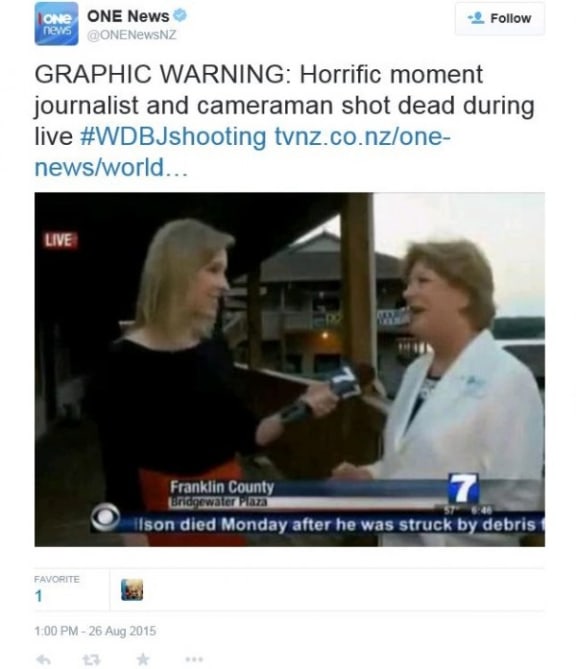Videos of ordinary people in vulnerable and distressing situations are widely shared on social media. These days, mainstream news websites post them online as news. Should people pull the media up for capitalising on this kind of clickbait? Or will a culture of complaint do no good in the long run?
When Privacy Commissioner John Edwards recently awoke to news that journalists had been shot dead live on air in the US by a disgruntled former colleague, he was startled to see this from TVNZ on his Twitter feed:

The tweet from TVNZ which upset John Edwards Photo: screen shot
The video didn't show the exact moment of death, but on The Privacy Commission's website he said a news organisation should not be circulating footage like that.
"It is an absolute affront to the dignity of life to offer up the last, terrified moments of a victim of an execution, for the momentary distraction of an online audience and to drive traffic to a commercial enterprise," John Edwards wrote.
And had this message for anyone reading his blog.
Read the standards, assess the content, and exercise your right of complaint if you think the media has overstepped the mark.
What goes too far?
Images of people being hurt or killed can be found on the news websites of our major news media, often from videos going viral on social media overseas. For example, a recent police shootings in the US and a woman killed by an escalator in China recently. Global news agencies first sourced the Chinese escalator tragedy from an online blogsite called The Shanghaiist, which has many startling picture stories where the dignity and wellbeing of individuals is not exactly paramount.
Many such stories are republished from The Mail Online, one of the world's most-visited news websites thanks in part to a heavy diet of 'clickbait'. A video of a young woman hysterical in a Hong Kong street, who is eventually restrained by police officers appeared on stuff.co.nz recently, while The New Zealand Herald's site carried the same story beginning like this:
Dumping your girlfriend by text is possibly not the most adult way to end a relationship - but what this woman did next was certainly not a grown-up way to deal with it.

How stuff.co.nz reported a viral video of a hysterical woman in Hong Kong. Photo: screen shot
One person pondering a formal complaint about this wrote to Mediawatch to say:
The article seems to be about little more than ridiculing a person having a distressing episode - or mental breakdown in public. It’s not a sight a reasonable person would enjoy watching, but with phrases such as 'epic breakdown' and 'threw a tantrum,' it seems to encourage ridicule of this woman's distress”. Where is the self-respect among the media?
Former New Zealand Herald editor-in-chief Gavin Ellis told Mediawatch editors should demonstrate that they won’t show some things just because they can. If they don't, he said, they need to be prompted.
"Where there's a mental problem involved, what is the public interest in running it? Probably none. As clickbait? Absolutely. I don't want to see the creation of a 'complaints climate' but there is a role to be played by individuals who genuinely believe that levels of decency and propriety have been breached," said Gavin Ellis.
One outfit that encourages people to complain is the Mental Health Foundation. It sends what it believes to be discriminatory media coverage to members of a Stigma Media Watch group and it website hosts a fill-in-the-blanks letter members can use.
Mental Health Foundation chief executive Judi Clements told Mediawatch it's had some success, but she deines they are telling the media what to do.
"We're trying to work with them. We're not trying to make editors uncomfortable," says Judi Clements. "We are working for soicial change.We actually get reassuring responses from the media".

